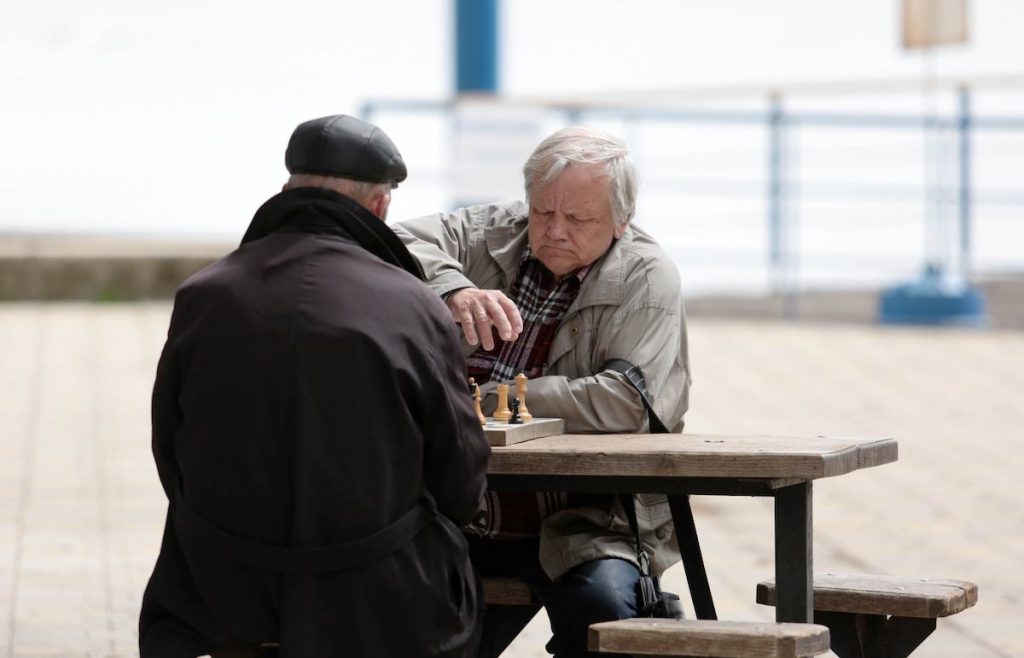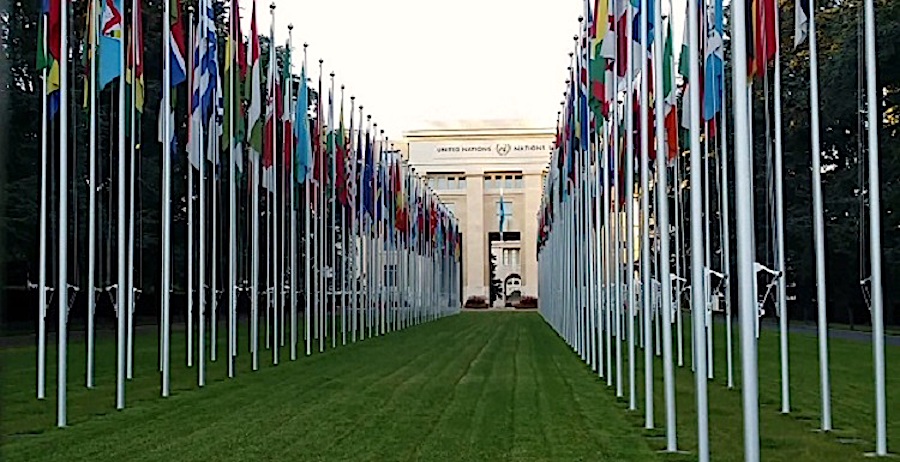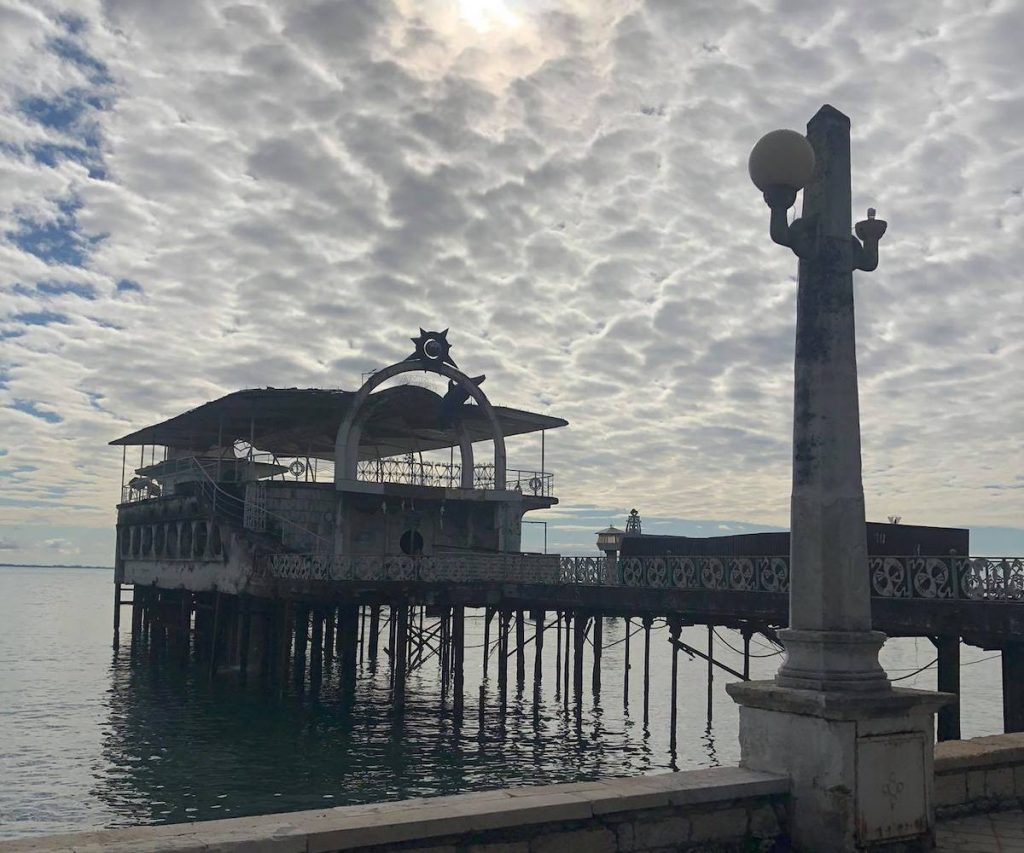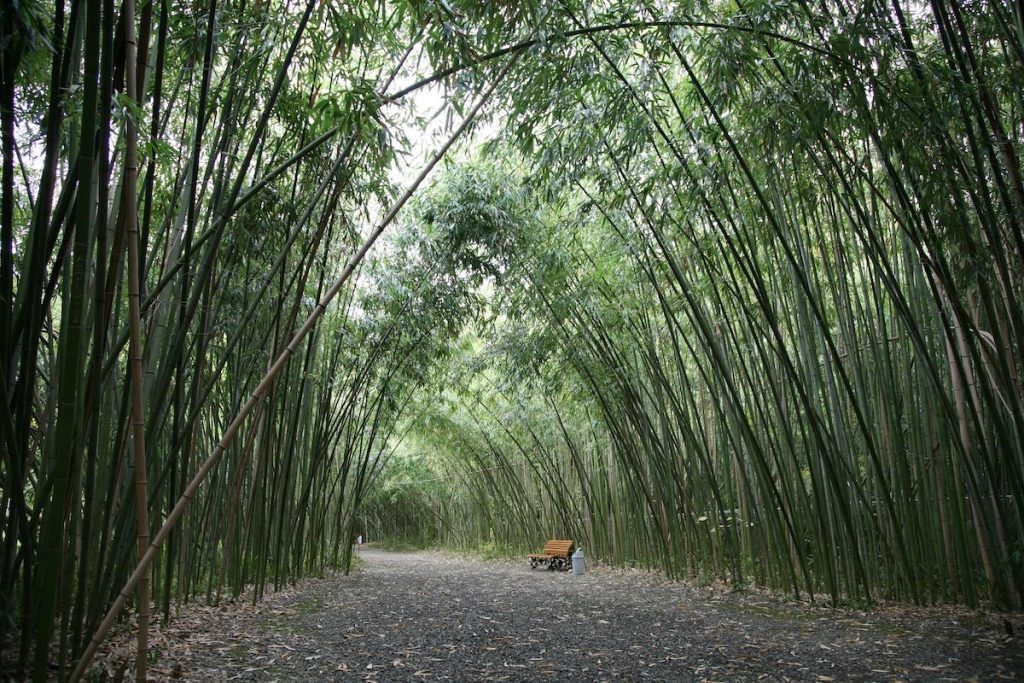What could Georgian-Abkhaz negotiations look like? An Abkhaz take
Because of the pandemic, the Geneva International Discussions – the only platform where the Georgian-Abkhaz conflict is discussed at the political level in one way or another – has taken a long pause.
But it is unlikely that experts on either side have perceived this as a problem; few perceive this format as a full-fledged process. The Georgian-Abkhaz talks are going through a forced break, but it has not affected the situation in any way.
What would a more productive negotiation process include? A view from the Abkhaz side.

Who is in conflict with whom?
The Geneva negotiating format was created following the August war over South Ossetia in 2008, after Russia recognized the independence of Abkhazia and South Ossetia.
The discussions in Geneva are Georgian-Russian negotiations under the auspices of the UN, the European Union and the OSCE on the settlement of the Georgian-Abkhaz and Georgian-Ossetian conflicts, with the participation of representatives of the Abkhaz and Ossetian sides. The creation of this international platform was provided for by the ceasefire agreement between Russia and Georgia, signed with the mediation of France after the end of the August 2008 war. The first round of negotiations took place in Geneva on October 15, 2008. Since then, the Geneva Discussions have been held several times a year in the format of two working groups. One deals with security and stability issues, the other with humanitarian aspects.
From the very beginning, this format was limited in its capabilities due to the fact that official Tbilisi began to consider its two former autonomies regions as occupied by Russia.
Since then, Tbilisi has insisted that there are no Georgian-Abkhaz and Georgian-South Ossetian conflicts, but there is a conflict between Georgia and Russia.
Sukhum, Tskhinvali and Moscow categorically disagree with this formulation of the problem. And these diametric views on the conflict, although they have not derailed the negotiations, nevertheless, significantly narrowed its powers.
In fact, discussions are taking place in Geneva, albeit with international mediation. Moreover, all the participants in these meetings are not present as official representatives of the parties, but only in their personal capacity.
Political scientist Liana Kvarchelia compares the Geneva process to a glass house:
“A step to the left or to the right – and the house can crumble. But at the same time, each side has its own arguments for preserving this glass house.
For the Georgian side, this is a platform in which neither Abkhazia nor South Ossetia are a party. It is important for Georgia to show that its counterpart in negotiations is Russia, and that Georgia has a conflict with Russia. This puts Georgia in the position of victim.”
According to Kvarchelia, then-Georgian President Mikheil Saakashvili was apparently inspired by the example of the Armenian-Azerbaijani negotiation format, in which Nagorno-Karabakh was not represented.
“The interest of the Abkhaz side in maintaining the Geneva site is also understandable – the Abkhaz have no other formal platforms on the international level, so it must be preserved,” says Liana Kvarchelia.
- Op-ed: the Georgian-Abkhaz conflict through the prism of the second Karabakh war
- Survey: majority of Georgians see prospects for change to improve relations with Abkhaz
“The Geneva Discussions unsuccessfully reformatted the negotiation process”
“It seems to me that this site has two significant drawbacks. First, the official status of the Abkhaz side in the negotiations has been lost. Second, the previous negotiation process was reformatted.
The Geneva discussions build on the events and aftermath of August 2008, while the previous stage of the negotiations followed from the events of 1992-1993. Thus, Georgia is trying to evade responsibility for unleashing a war with Abkhazia, shifting its attention to the Russian factor,” says Kvarchelia.

Direct negotiations – arguments ‘for’ and ‘against’
From time to time, both in Tbilisi and in Sukhum, politicians declare the need for direct negotiations. However, the matter does not go further than talk.
“Even within the current Geneva [talks], it would be possible to create bilateral platforms. But for this Georgia needs to recognize Abkhazia as a party to the negotiations. Unwillingness to do this is the main obstacle in the creation of bilateral platforms,” political scientist Liana Kvarchelia believes.
Since the moment Aslan Bzhania became president of Abkhazia in April 2020, the possibility of direct negotiations from a rhetorical view has grown into an official document – at least from the side of Sukhum.
In November 2020, the president approved the Foreign Policy Concept, and there is a paragraph dedicated to relations with Georgia:
“The Republic of Abkhazia admits the possibility of creating conditions for the formation of an additional format of multi-level negotiations between Georgia and the Republic of Abkhazia, within the framework of which it will be possible to discuss with the Georgian side issues of mutual interest, the solution of which is not possible within the framework of the International Geneva Discussions.”
Despite the very cautious formulations with the desire to give new impetus to the practically deadlocked process of the Georgian-Abkhaz settlement, a tough reaction from the opposition followed. One of the leaders of the opposition organization “Aruaa”, uniting veterans of the war with Georgia, Temur Nadaraia said that “any negotiations outside the Geneva format are a surrender of our positions.”
Secretary of the Security Council of Abkhazia Sergei Shamba does not consider direct dialogue with Georgia dangerous for Abkhazia:
“The danger comes not from the dialogue itself, but from its absence.”
“Diplomacy itself does not carry any danger. If someone fears that the Abkhaz side through direct negotiations may yield some of its principled positions, then in this Concept it is written that dialogue with Georgia can be based only on mutual recognition.
It is clear that we are not going to deviate from our basic interests. They, obviously, are also not going to deviate from their fundamental interests. But between these extremes there are always questions where compromise solutions can be found,” says Shamba.

“The situation will improve if Tbilisi abandons the insulting law on the occupied territories”
Akhra Bzhania, head of the Akhyatsa public organization, says that it is Tbilisi’s policy that does not make it possible to implement the idea of direct Georgian-Abkhaz negotiations. In Georgia, there is a law on the occupied territories, according to which Abkhazia is occupied by Russia, and the Abkhaz government is a puppet regime with which it is useless to talk.
“If Georgians really want to talk to us, they must first of all abolish this law that offends us. And also declare the principle of not using force in our relations. Perhaps Tbilisi could recognize the Abkhaz documents so that we can move around the world, ”says Akhra Bzhania.
The “Law on the Occupied Territories” affected all spheres of life in Abkhazia, from the economy to the social sphere. But above all, he hit ordinary people.
- A hydropower plant of war and peace
- Elections in Georgia: how parties are planning to solve the territorial conflict
Impossible or difficult to travel
In particular, the inhabitants of Abkhazia are deprived of the elementary right – free movement around the world.
With an Abkhaz passport, you can only get to Russia and those few countries that have recognized the Abkhaz statehood. This problem could be solved due to the fact that most of the locals also have Russian citizenship. However, at the request of Tbilisi, the European Union does not recognize Russian passports issued on the territory of Abkhazia. In the visa services of European states, such documents are not even accepted for consideration.
Even when, as an exception, the organizer of some music festival or sports tournament in Europe manages to agree to grant visas to the residents of Abkhazia, the Georgian Foreign Ministry intervenes in the situation, and the barrier is inevitable.
The president of the football club Dynamo Sukhum Astamur Adleiba recalls how the Abkhazian national team was never allowed to enter Hungary in 2015 for the European Championship under the auspices of KONIFA (a confederation uniting football federations not represented in FIFA).
“The Consul General of Hungary in Russia even refused to accept the documents. He said that he was following the instructions of the Minister of Foreign Affairs, who personally called him, who, in turn, was asked by his Georgian colleague. ”
Having received a refusal from the Hungarians, the Abkhaz did not give up, they were able to negotiate visas with the government of Slovakia.
“But here, too, nothing came of it. The Hungarian authorities announced to the KONIFA leadership that they would close the border with Slovakia for the Abkhazians, and if they nevertheless get into Hungary in some roundabout way, then Budapest will ban the championship altogether. We were never allowed to enter Hungary, ”says Adleiba.
To enable Abkhaz to move about in the world, Tbilisi offers them so-called “neutral passports”, which Georgia itself issues. However, for all the years of the validity of this document, only a few took it, but at the same time, each holder of such a passport hides its presence even from relatives.
What are the main problems that cannot be resolved due to the unresolved Georgian-Abkhaz conflict? This question is answered by JAMnews residents of Abkhazia
Impossible or difficult to do business
The law on occupation also hits the Abkhaz economy hard. Since he was fully supported by the European Union, any business with Abkhazia fell under the taboo.
The Abkhazian mobile operator Aquafon has been using the equipment of the Finnish company Nokia for a long time. However, after the announcement of sanctions, the Finns unilaterally broke the contract and stopped supplying equipment to Abkhazia.
“As a result, we had to negotiate with the Chinese and completely re-equip. Now the equipment is supplied to us by Huawei. The transition from one supplier to another cost us several million euros in losses, ”says one of the Aquafon managers, Daur Kuchuberia.
- Zakareishvili: “Sooner or later the authorities will have to consider my ideas”
- Trans-Caucasus railway: Moscow-Sukhum/i-Tbilisi-Yerevan – no beginning, no end
“Banking transactions with Abkhazia are considered ‘toxic'”
The chairman of the commercial bank Amra-Bank, Mikhail Chalmaz, said that almost everything from Tbilisi was closed to Abkhaz financial institutions with the help of Europe: “Not only get a loan – even an ordinary payment from an Abkhaz bank to any European bank is impossible.”
All transactions in the banking sector are carried out through correspondent accounts opened with Russian banks. But even there, everything is not simple.
“Operations with us are perceived in Europe as“ toxic ”. Not every Russian bank wants to do business with us, as it may then have a problem with European partners. Therefore, basically, those Russian banks that are themselves under sanctions from the European Union cooperate with us,” says Chalmaz.
The existing sanctions greatly slow down the development of the Abkhaz banking system. Due to the inability to take out cheap loans from foreign financial institutions, Abkhaz banks are experiencing a monetary deficit. If they give loans to local businesses, then with an off-scale interest rate – from 25% and above. And the loan itself is provided for a short period – no more than a year.
The only spoonful of honey in the huge tar barrel of the Georgian policy towards Abkhazia for ordinary people is the medical program implemented by Georgia. Even during the presidency of Mikhail Saakashvili, Georgian clinics undertook to treat ethnic Abkhazians free of charge.
Initially, there were very few people willing to come for treatment, even in severe cases. This was explained by two factors:
In exchange for the free provision of medical services, the patient had to take either Georgian citizenship or a “neutral passport”. In addition, there was an ethical barrier – “you cannot go to the enemies for treatment”. People who stepped over this barrier tried not to advertise their Georgian tour.
However, when Saakashvili was replaced by Bidzina Ivanishvili, the medical program lost its overt political component. Since that time, Abkhazians can come for treatment without having to take a Georgian or neutral passport. This decision has significantly increased the number of people seeking help in Georgian clinics, especially since the quality of medical services in Georgia is undoubtedly much better than in Abkhazia.
And most of them no longer make secrets about their trips.

Energy is the only survivor of the Georgian policy of isolating Abkhazia
Perhaps the only non-political sector that has not been affected in any way by the Georgian policy of isolation in relation to Abkhazia is energy.
The only source of Abkhazian electricity is the largest hydroelectric power station in the South Caucasus, the Ingur hydroelectric power station, which is under the dual Georgian-Abkhaz subordination. The dam is located on the Georgian side, and the station itself is on the territory of Abkhazia.
This aspect initially turned cooperation in the energy sector into an uncontested act, by default taken out of the general framework of the Georgian-Abkhaz confrontation. Active cooperation between power engineers began immediately after the end of the 1992-93 Georgian-Abkhaz war and has not been interrupted since then.
According to Akhra Bzhania, who participated as an Abkhazian representative in negotiations with Georgian energy specialists, this cooperation is taking place due to a geographical incident.
“If this border with Georgia ran two kilometers to the west, then the entire cascade of the station would be on the Georgian side. And in this case, they would hardly supply us with 40% of the generation of the Ingur hydroelectric power station, as it is happening now ”.
Terms, place names, opinions and ideas suggested by the author of the publication are her / his own and do not necessarily coincide with the opinions and ideas of JAMnews or its individual employees. JAMnews reserves the right to remove comments on posts that are deemed offensive, threatening, violent, or otherwise ethically unacceptable.


















